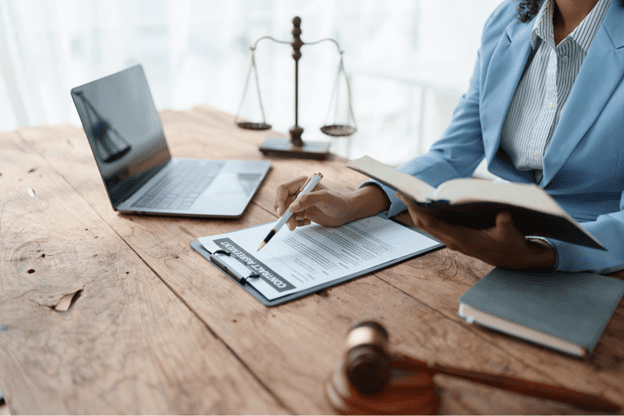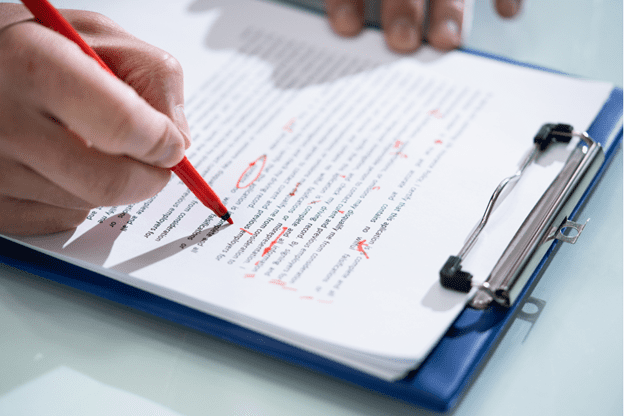5 Best Legal Transcription Companies (2024)
Find the best legal transcription companies. Get accurate services, costs, and use cases for transcription services so you can get your time back.

You’ve got a mountain of audio files piling up—court proceedings, depositions, witness interviews—all waiting to be transcribed.
Time is ticking, deadlines are closing in, and you’re battling with messy, inaccurate AI-generated transcripts that take more time to edit than they’re worth. You need clear, accurate legal transcripts, fast.
But how do you find the best legal transcription company to trust with this critical task?
This guide is here to help you navigate that decision, so you can find a transcription partner that aligns with your needs and keeps your cases on track!
What Is Legal Transcription?
Legal transcription is the process of converting spoken legal proceedings, recordings, or dictations into written text. This covers legal documents, including court hearings, depositions, legal briefs, wiretap recordings, and more.
Transcripts are used in court cases, trial preparation, appeals, or legal research. The transcripts have to be without error to make sure that arguments are made with fidelity and full access to the facts.
Types of Legal Transcription
Legal transcript is a term that covers a wide variety of legal documents that are used throughout a legal proceeding. Here are a few examples of types of legal transcripts:
Court transcripts
These are verbatim records of courtroom proceedings, including everything from hearings to full trials. They’re crucial for appeals, reviews, and legal documentation.
Depositions
Depositions capture sworn testimonies given outside of court. Lawyers use them for case prep, evidence gathering, and witness cross-examination.
Testimonials
These involve statements or interviews with witnesses, victims, or other individuals related to a case. They help build case strategies and clarify details.
Legal briefs
Legal professionals often dictate briefs, notes, or reports, which are then transcribed to create formal documents for filing or case preparation.
Wiretap and surveillance
These transcribe recordings of phone calls, wiretaps, or surveillance audio used in investigations. They must be accurate and clear to support legal arguments.
Mediation and arbitration
These transcriptions record conversations during arbitration or mediation, capturing negotiations or settlements outside the courtroom.
How Legal Transcription is Used in Legal Proceedings
Legal transcription plays a huge role in keeping legal proceedings organized and effective. Here’s how it comes into play:
Trial Preparation
Whether it’s deposition transcripts, witness testimonies, or pre-trial hearings, these records help lawyers review past statements, analyze evidence, and tighten up their strategies.
Appeals
When challenging a court decision, accurate transcripts are essential to point out procedural errors or unfair rulings.
Depositions
During discovery, transcripts allow attorneys to pinpoint inconsistencies or verify witness credibility.
Evidence Review
From recorded interviews to police reports, transcripts give legal teams a clear view of all the facts, helping them build a solid case.
Legal Documentation
Keeping clear, accurate records is key for compliance, analysis, and ensuring the judicial process stays on track.
Top 5 Legal Transcription Companies
There are a lot of transcription companies out there—but not all of them are cut out for legal transcription. Here are the top-ranking, best legal transcription companies on the market:
#1: SpeakWrite
SpeakWrite is a human-powered legal transcription service that offers transcription for court proceedings, depositions, and interviews, and provides transcripts in compliance with legal standards.
Feature | Details |
What | SpeakWrite uses experienced legal transcriptionists to deliver transcripts with 99% accuracy. It offers quick turnaround, often within hours, and supports legal-specific formatting. |
Cost | Pricing starts at $1.25 per minute of audio. |
Pros |
|
Cons |
|
Use Case | Ideal for law firms needing detailed and court-ready transcripts for trials, appeals, depositions, and evidence review. |
#2: GoTranscript
GoTranscript offers human-powered legal transcription services for court hearings, depositions, and more. It provides affordable options for legal professionals seeking clear, detailed transcripts.
Feature | Description |
What | GoTranscript offers legal transcription services using both human transcribers and AI for faster results. It handles court proceedings, depositions, and other legal audio with secure and accurate transcription. |
Cost | Prices start at $0.77 per minute of audio, with various plans available for bulk and urgent requests. |
Pros | Cost-effective options, multilingual support, quick turnaround for AI transcriptions. |
Cons | Human transcription may have slower turnaround times, accuracy can vary based on audio quality. |
Use Case | Suitable for legal professionals needing accurate transcriptions of interviews, depositions, or case meetings within a reasonable budget. |
#3: LexTranscribe
LexTranscribe offers legal transcription services specifically designed for the legal sector, including court hearings, depositions, and legal briefs. Their focus is on accuracy and legal compliance.
Feature | Details |
What | LexTranscribe uses experienced legal transcriptionists to provide detailed and legally formatted transcripts for various legal documents, ensuring compliance with legal standards. |
Cost | Pricing starts at $1.00 per minute, with potential additional fees for rush orders or complex formatting. |
Pros | Tailored for legal industry needs, high accuracy and confidentiality, multilingual support. |
Cons | Higher cost for expedited service, limited availability during peak demand. |
Use Case | Ideal for law firms, legal departments, and solo practitioners needing accurate transcripts for court proceedings, depositions, and legal documentation. |
#4: Ditto
Ditto offers specialized legal transcription services for depositions, hearings, and legal interviews. They provide tailored formatting for legal standards and offer human-powered accuracy.
Feature | Details |
What | Ditto’s transcriptionists produce legally compliant transcripts, focusing on court proceedings, depositions, and legal meetings. They offer specific formatting per legal requirements. |
Cost | Pricing starts at $1.20 per minute, with additional costs for expedited services or complex formatting. |
Pros | High accuracy, tailored legal formatting, and quick turnaround options. |
Cons | Higher costs for rush orders and limited availability for large-scale projects. |
Use Case | Best for law firms, legal consultants, and paralegals who need accurate transcripts for court use, trial preparation, and legal documentation. |
#5: Flatword Solutions
Flatworld Solutions offers a wide range of legal transcription services, including court transcripts, legal correspondence, and evidence documentation. They focus on providing global clients with accurate, human-powered transcriptions.
Feature | Details |
What | Flatworld Solutions specializes in human-powered legal transcription, covering court documents, depositions, and legal memos with accurate formatting. |
Cost | Starts at $1.00 per minute, with added fees for urgent requests or special formatting. |
Pros | Multilingual support, accurate formatting, and cost-effective pricing. |
Cons | Longer turnaround times for high-volume requests; extra charges for expedited services. |
Use Case | Ideal for legal firms, international legal teams, and researchers needing reliable transcripts for trials, depositions, and legal documentation. |
When it comes to transcription, there are two primary types: AI-powered and human-powered transcription. Both have their perks, and the right pick depends on what you’re after.
Want lightning-fast results? AI’s got your back. Need accuracy with a side of nuance? Humans are the MVPs. Let’s dive into the pros and cons to find your perfect match!
AI Transcription
AI transcription uses software to automatically convert speech into text. It’s fast, cost-effective, and ideal for situations where you need a quick draft.
AI is best suited for clear audio, straightforward content, or large volumes of material where speed matters. However, it struggles with accents, overlapping dialogue, and complex legal terminology, often requiring additional editing for accuracy.
Human Transcription
Human transcription is done by trained professionals who listen to the audio and transcribe it manually. It delivers greater accuracy, particularly with complex legal language, multi-speaker scenarios, and poor audio quality.
Human transcriptionists understand context, nuances, and legal formatting, making this method essential for legal use cases like depositions or trial preparation, where accuracy and compliance are critical.
Feature | AI Transcription | Human Transcription |
Pros | Fast, cost-effective, handles large volumes | High accuracy, understand context, legal formatting |
Cons | Limited accuracy, struggles with jargon | Slower turnaround, higher cost |
Cost | Low to moderate | Moderate to high |
Use Cases | Quick drafts, general overviews | Legal cases, depositions, compliance, court trials |

You’re looking for more than just a transcription company. You’re looking for a partner who can convert audio to text with complete accuracy, security, formatting customization, and customer support so you get exactly what you need for court. Here’s what to prioritize.
Accuracy
Legal transcription isn’t the place for mistakes. Look for services that guarantee at least 99% accuracy, particularly with complex language and multi-speaker settings.
Human transcription services generally outperform AI in understanding the nuances of legal terminology and conversation flow.
Security
Security is non-negotiable for legal documents, especially given the sensitive nature of case materials. The transcription company you choose must offer encrypted data handling, secure file storage, and compliance with regulations like GDPR and HIPAA.
Check if the company provides extra security features, such as password-protected portals and secure access for employees.
Customizations
Each legal case is unique, and your transcripts should reflect that. Choose a transcription company that offers customizable formatting—like specific timestamps, speaker labels, or detailed legal structures for depositions, court transcripts, and wiretaps.
Support
Legal deadlines can’t wait, so you’ll need a transcription company that offers robust customer support, ideally 24/7. Responsive support means you’ll meet your deadlines and get the exact results you need, every time.
Now that you know what to prioritize in a legal transcription company, what other criteria should you evaluate when choosing between legal transcription options? Here’s a checklist of what to look for and how to evaluate if the transcription company is up to par.
Accuracy should be guaranteed at 99% or higher.
Legal transcription demands precision, so always choose a company that ensures at least 99% accuracy to avoid costly errors.
Human transcriptionists are more reliable than AI.
For handling complex legal terminology and nuances, human transcriptionists provide a level of understanding that AI solutions often miss.
Reviewing sample transcripts is essential.
Ask for samples to evaluate the quality, attention to detail, and overall reliability of the company’s work.
Encryption and compliance practices should protect your data.
Ensure the company uses secure, encrypted file transfers and complies with laws like HIPAA and GDPR to safeguard sensitive information.
Non-disclosure agreements ensure confidentiality.
A reputable company will offer NDAs to guarantee the confidentiality of your legal documents and client information.
Transcripts should be stored securely.
Check that the company stores transcripts securely and limits access to authorized personnel only.
Expedited delivery options should be available for urgent needs.
Look for companies that offer both standard and expedited delivery to handle time-sensitive cases.
Consistency in meeting deadlines is critical.
Review customer feedback to ensure the company delivers transcripts on time without compromising quality.
Custom templates make legal compliance easier.
Opt for companies that can provide transcripts formatted to meet specific court or legal requirements.
Specialized features should enhance usability.
Choose a company that offers add-ons like timestamps, speaker identification, or witness labeling for more functional documents.
Pricing should be transparent and upfront.
Avoid companies with hidden fees by choosing one that offers clear, straightforward pricing.
Rates should be competitive for ongoing or bulk work.
Compare rates per minute to ensure you’re getting the best value for your transcription needs.
A trial period helps you test the service.
Start with a trial to evaluate turnaround times, quality, and customer service before committing to a long-term partnership.
24/7 support ensures availability for urgent issues.
Select a company that offers around-the-clock support to handle last-minute questions or deadlines.
Dedicated account managers simplify communication.
Having a dedicated point of contact can streamline interactions and resolve issues more efficiently.
Strong ratings reflect the company’s reliability.
Look for companies with high ratings and positive reviews on legal service platforms to ensure quality.
Testimonials from legal professionals offer valuable insights.
Read detailed testimonials from other legal professionals to gauge the company’s reliability and overall satisfaction.
Benefits of Legal Transcription for Your Law Office

Your law office will benefit from legal transcription in a bunch of ways:
Higher accuracy
Human transcriptionists are trained to capture the smallest details, nuances, and legal terminology. They make sure that your transcripts are accurate and comprehensive. Now you have a real edge in court prep, appeals, and depositions.
Increased compliance
Professional services prioritize court-ready formatting and data protection, adhering to regulations like HIPAA and GDPR. When you hand off transcription to the pros, you’re getting peace of mind that your evidence meets legal standards and won’t get thrown out on a technicality.
Time saver
What if you could save hours each week? Professional services deliver transcripts fast—sometimes within just a few hours. This speed means more time for case strategy, client meetings, and courtroom prep. No more struggling through long audio files or manual typing.
Better formatting
The right transcription partner offers tailored options, whether it’s timestamps for evidence review, speaker labels for depositions, or complex formatting for court submissions. Every document meets court standards.
Confidentiality
Your legal documents are sensitive, and you can’t afford to gamble with their security. Professional transcription services use encryption and secure servers to keep everything confidential.
Multilingual support
Professional transcription companies offer multilingual support so you can handle evidence or testimony in other languages. You get seamless translations that maintain context and accuracy so that nothing gets lost in the legal process—even across language barriers.
Legal Transcription Compliance Considerations
Compliance in legal transcription is essential. The best services know their way around laws like HIPAA, GDPR, and ECPA.
They should be able to certify transcripts for legal admissibility and meet court formatting standards—like timestamps, speaker labels, and structured documents that match jurisdictional requirements. Choose wisely, and your transcripts will be assets, not liabilities.
Legal Transcription Companies: Frequently Asked Questions
Is legal transcription still in demand?
Yes, legal transcription remains in high demand as law firms, courts, and legal professionals require accurate documentation of hearings, depositions, and other legal proceedings. It’s crucial for maintaining clear records, supporting appeals, and trial preparations.
How much do legal transcriptionists cost?
Legal transcription rates typically range from $1.25 to $3.00 per minute of audio. Costs can vary depending on turnaround time, complexity, and whether the service uses human transcriptionists or AI.
How much can a legal transcriptionist make?
Legal transcriptionists can earn between $20,000 to $60,000 per year, depending on their experience, location, and whether they work independently or for a company. Specialized skills, like understanding legal jargon, can increase earning potential.
How do you get into legal transcription?
To get into legal transcription, you typically need a strong command of legal terminology, excellent typing skills, and attention to detail. Many professionals complete a legal transcription certification course and start working with transcription companies or freelance.
Are you ready to work with the top legal transcription company? Tired of court documents and audio recordings bogging down your workflow? SpeakWrite has the solution for you.
Our transcription service delivers highly accurate, well-formatted transcripts within as few as three hours. With our simple process, you can improve your workflow without the hassle of transcription.
Our team follows your specific instructions on spelling, formatting, and content to ensure top-notch results. Try a free trial today and experience the time and cost savings of our expert transcription service.
